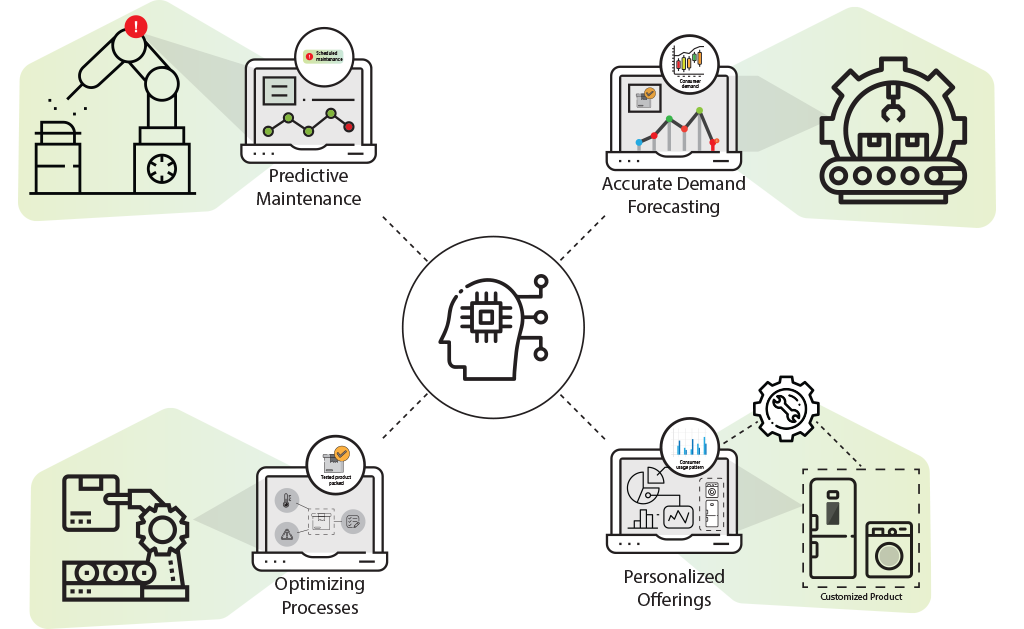How artificial intelligence can lift business productivity

Prima Saraiya
With recent innovations in data storage, analysis and cloud computing, artificial intelligence is improving efficiency and performance in businesses. As per Research and Markets report, AI market is projected to grow at a CAGR (Compound Annual Growth Rate) of 52% till 2025.
It helps entrepreneurs make more informed business related decisions. AI has the power to increase productivity of a business by integrating with information and communication systems, delivering intelligent machine automation, providing early warnings of potential problems and much more, says Prima Saraiya, senior marketing executive, Volansys.
Here are few ways how business owners can raise their sales and productivity using artificial intelligence (AI) and machine Learning (ML).
Predictive maintenance
Previously, approach to asset (equipment’s /appliances) maintenance was tedious and reactive. However, today with artificial intelligence and machine learning in place, organisations have started investing in predictive maintenance solutions that improves operating efficiency. Predictive maintenance uses sensors to track the conditions of equipment and analyses data on an ongoing basis, enabling organisations to service equipment when they actually need it instead of at scheduled service times, thereby minimising downtime.
Machines can even be set up to assess self-conditions, order required replacement parts and schedule a technician when needed. Taking predictive maintenance even further, algorithms based on big data can be utilised to predict future failures.
Thus, it can be said that AI-enhanced predictive maintenance of industrial instruments/machines can reduce annual maintenance costs, downtime and inspection costs. As per an A. T. Kearney survey in Industry Week of 558 companies using predictive maintenance, an average of 20.1% reduction in equipment downtime was observed.
Accurate demand forecasting
In Supply Chain, demand forecasting is a fundamental tool for order planning and general strategy. It aids inventory supervisors in planning monthly orders, understanding seasonal trends, saving time on re-ordering and diminishing Stock-Outs. Technology learns from past and can evaluate the complex factors involved in demand forecasting like market and economic forces, latest trends, etc.
This enhances forecast accuracy and eliminates guesswork. AI enabled forecasting ensures product availability, at the same time reducing inventory pile-up. It helps businesses understand their customer purchasing pattern in detail. Using this market-basket analysis, sales teams are also able to create demand for other products.
This can not only improve the demand forecast, it can help the organisations generate business. It is similar to consumer e-commerce websites, such as Amazon recommending products based on browsing or buying patterns. Recently, a retailer of bikes and kayaks with 600 stores reduced their inventory requirements by 7% and inventory carrying cost by 4.5% using AI enabled demand forecasting tools.
AI can also increase efficiencies of tasks as simple as taking physical inventory. A task that may take days to complete can be completed in 24 hours using camera enabled drones that fly through the warehouse, scan items, and check for misplaced items. Thus, using AI and ML, systems can test multiple mathematical models of demand, production, outcomes with precision and also place material procurement orders based on this analysis.

Fig 1: Ways in which AI enhances productivity
Personalised offerings
Today, consumers prefer customised, personalised, and unique products/services over standardised ones. Developments in AI and software intelligence are enabling businesses to take personalisation to the next level by building services and products that are highly pertinent to individual consumer’s needs.
It is imperative as personalisation sells. Such businesses have an opportunity to create differentiated propositions that may command a price premium, improve consumer traffic and conversion. A recent consumer survey by Deloitte showed that 20% of consumers are willing to pay a 20% premium for personalised products or services. This also enable brands to build greater trust with their customers via personalised offerings. 83% of consumers in both the U.S. and U.K. are fine with trusted retailers using their personal information in order to receive tailored products, offers and recommendations.
Optimising processes
Machines powered by artificial intelligence (AI) engines running Machine Learning Algorithms are capable of improving manufacturing processes efficiency. AI system monitors parameters like cycle time, temperatures, quantities used, lead time, down time and errors to optimise manufacturing/production of a business.
Analysing sales calls is one of the crucial aspects of businesses. In the past, it was a manual process, but now AI conversational tools are automating the entire process, thus reducing efforts and saving time. Such tools record each outbound call and pick-up cues that identify how the call went. Machine learning algorithms also quell frauds in businesses by spotting anomalies and discrepancies in day-to-day data exchange processes.
Thus, machine based neural networks can understand large volumes of data in seconds, providing perfect solutions at the fingertips of decision makers, boosting efficiency and business sales. It offers real time insights that can be applied to rapidly changing business environments.
The author is Prima Saraiya, senior marketing executive, Volansys
Comment on this article below or via Twitter @IoTGN
